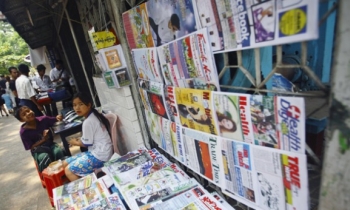Feb. 8 (Bloomberg) -- French satirical weekly Charlie Hebdo published a new cartoon of the prophet Muhammad on its cover, as a French Muslim group, in a plea for free expression, condemned the violence that Danish caricatures sparked in Muslim countries.
The wave of protests, ``orchestrated four months after the facts, aims at caging all freedom of thought by artists and intellectuals,'' Tewfik Allal, of the Association of the Freedom Manifesto, a Muslim organization, wrote. ``Other communities -- Jews, Christians -- have felt insulted by this or that text, drawing or thought, but they reacted by going to court.''
Charlie Hebdo, on the inside pages of today's issue, also published the 12 Danish cartoons, first carried by Jyllands- Posten in September.
The cartoons have been reprinted in countries including Austria, Germany, Hungary, Italy, and Switzerland, where editors said they were defending freedom of expression.
The French newspaper France Soir published the 12 cartoons on Feb. 1, with a headline that claimed ``the right to caricature God.'' The newspaper's editor, Jacques Lefranc, was dismissed the following day by France Soir's publisher, Egyptian-born Raymond Lakah, a Christian.
Because visual representation of Muhammad is considered blasphemy by Muslims, the cartoons sparked the anger of believers.
Danish Boycott
In countries including Kuwait and Saudi Arabia, Muslims are boycotting Danish goods, and, in the Gaza Strip, Palestinian militants threatened to kidnap Westerners if governments don't apologize for the actions of newspapers in their countries.
Iran cut trade relations with Denmark when President Mahmoud Ahmadinejad on Feb. 4 issued a decree calling on the Trade Ministry to terminate economic agreements with all Western countries where the cartoons were published.
The protests prompted United Nations Secretary General Kofi Annan to call on Muslims to refrain from violence on Feb. 6, after crowds set fire to the Danish consulate in Beirut, and after the Danish and Norwegian embassies in Syria's capital, Damascus, were attacked.
The editor-in-chief of Jyllands-Posten apologized for offending Muslims. The cartoons first published in the Danish newspaper included a depiction of Muhammad wearing a turban in the shape of a bomb.
To contact the reporter on this story: Gabriele Parussini in Paris at gparussini@bloomberg.net.









